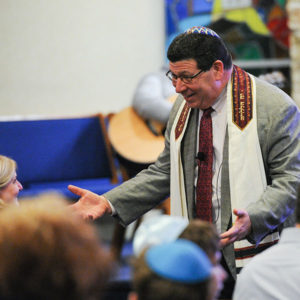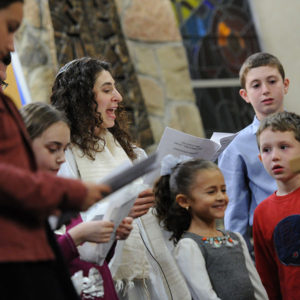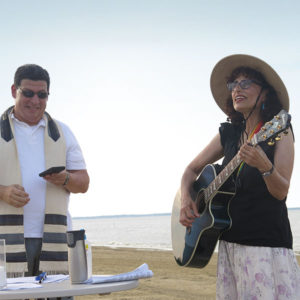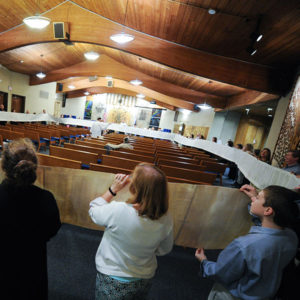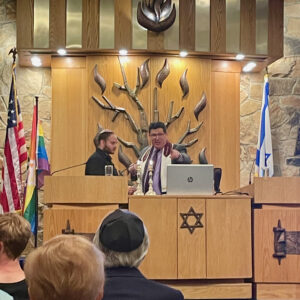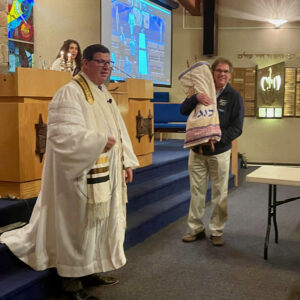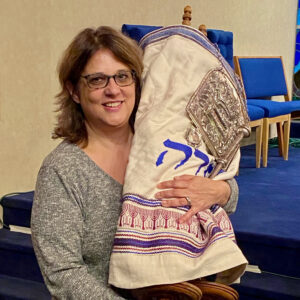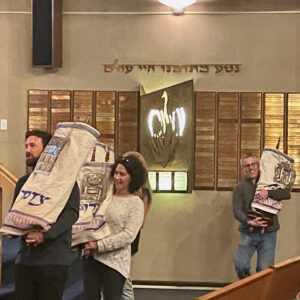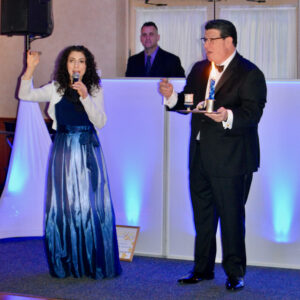Please Join Us
Prayer is a language that each of us speaks and hears in a different way. When we pray together, we try to find meaning within the chorus of diverse voices. With engaging sermons, stimulating teachings, and meaningful prayer intertwined with music, our clergy show us how the lessons from the past are relevant to our lives today.
Through a wide range of spiritual experiences we offer something for everyone, including weekly Shabbat evening and Shabbat morning services. In addition, special services are held throughout the year which include “Pray and Play,” “Shalom Yoga,” and so much more.
Our services are fully egalitarian (men and women participate equally). We believe we have found a healthy balance between the traditional and the creative. Services are a blend of Hebrew and English that helps everyone feel comfortable. Our prayer book, Mishkan T’filah, contains transliterations adjacent to all Hebrew prayers so that everyone, including guests, can participate easily and fully. We use both traditional and contemporary melodies. People who attend vary from those with traditional backgrounds to Jews by choice as well as guests of all faiths.
Schedule of Services:
Shabbat Evening Service
Erev Shabbat Services: Fridays, 7:30 pm (except the 1st Friday night of the month)
Kabbalat Shabbat Services: 1st Friday night of the month – 6:30 pmMorning Service
Saturdays
10:30 am, September - JuneRock Shabbat Services
Check here for more information on our next musical Shabbat service.
Rabbi's Most Recent Shabbat Greetings:
The Torah portion is Metzora (Leviticus 14:1-15:33), and this year it falls on the Shabbat immediately before Passover and it is called “Shabbat HaGadol.” The portion has God describing the purification ritual for people and homes afflicted with skin diseases. God also instructs Moses and Aaron regarding the laws of the emission of bodily fluids. As this is a special Sabbath, the haftarah is from the prophet Malachi (3:4-24) – allow me to explain:
“I should have switched from Scotch to Martinis.” “I’m bored with it all.” “Either that wallpaper goes or I do.” (spoiler alert – the wallpaper wasn’t changed.) These quotes were allegedly uttered by Humphrey Bogart, Winston Churchill and Oscar Wilde respectively just before they each died. After everything they had contributed to cinema, politics and literature, would they really have wished to be remembered for these parting words?
Closer to home, what would you want your final words to be? Imagine if it turned out that you were the last prophet to be included in the middle section of the Hebrew Bible – Neviim/Prophets? Preceded by the likes of giants such as Joshua, Samuel, Isaiah and Ezekiel, which words and thoughts would be important and inspirational enough to close the book? It’s a difficult question isn’t it? With the weight of Jewish history resting on your shoulders, who would wish to carry this burden? The answer is the prophet Malachi.
The literal meaning of the name is “my messenger” and he seems to have prophesied during the rule of the Persian Empire, not long after the Jews returned to Jerusalem to start rebuilding the Temple under the leadership of Ezra and Nechemiah. There’s only one problem, we don’t know who he is. The Talmud (Megillah 15a) states that he was non-other than Mordechai of Megillat Esther fame. Other opinions hold that he was Ezra. A third view is that instead, he was an anonymous prophet. The times in which he lived were characterized by a difficult period in our history when morale was at an all-time low. Following a familiar pattern, the Jews had strayed from the path of righteousness. The Kohanim (High Priests) were not meticulous in the proper ritual involved in offering up sacrifices and the people were lax in providing their tithes. In short, they were not displaying the respect they should have shown in their worship of God. Malachi admonishes them but as the days of prophecy were drawing to a close, he knew that he had to resort to a huge morale booster to remind them of what could take place – if only they would open their hearts and minds to God.
In the final couple of verses, he states the following: Remember the Teaching of Moses My servant, which I commanded to him at Horeb (Sinai), statutes and laws for all of Israel. Behold, I will send you Elijah the prophet before the great and terrible day of Adonai. (3: 22-23)
It is this Haftarah that we read on this special Shabbat, Shabbat Hagadol (The GREAT SABBATH). If these were my parting words, I don’t think I would leave a particularly memorable legacy. What is really happening here? Our Sages tell us that in the year of the Exodus, the Shabbat before the exodus from Egypt fell on the 10th of Nisan. This was the day that the Israelites were told to house a lamb in preparation of what was about to transpire on the following Wednesday afternoon when it would be offered up as the first Korban Pesach (paschal offering). That Shabbat was also the day when they realized that the Exodus was really happening. The Egyptians who could have attacked the Israelites for taking an animal that was one of the gods they served, did nothing to stop this happening. They stood in amazement and it was truly a portent of the seismic events that were about to transpire.
It was therefore a ‘great’ Shabbat if you happened to be a member of the twelve tribes. Five days later, following the great and awesome Seder night. They experienced their first taste of what it meant to be liberated from slavery – to be recognized as a legitimate nation.
Passover is the festival of freedom and from time immemorial, we have believed that when we achieve the real freedom that will come to us, this will be heralded by the appearance of Elijah at Passover. Malachi was therefore telling us that though times were tough and it looked as if our future was uncertain, God would send Elijah in the future to rescue us from the fate that would befall those nations who persecuted us – on the great and terrible day of Adonai.
The very last verse states: And I will return the hearts of parents back to their children and the hearts of children back to their parents, lest I come and lay the earth waste.
There could be no more fitting haftarah for the Shabbat before we celebrate Passover to inspire us to work towards bringing forth the ultimate Exodus. A return from the Galut – the exile when the ‘hearts of parents and the hearts of children will be reunited’. It is the ultimate Geulah – redemption.
Wishing you and your families a Chag Pesach Sameach – a happy, healthy, wonderful Passover.
SHABBAT SHALOM
Keep Reading